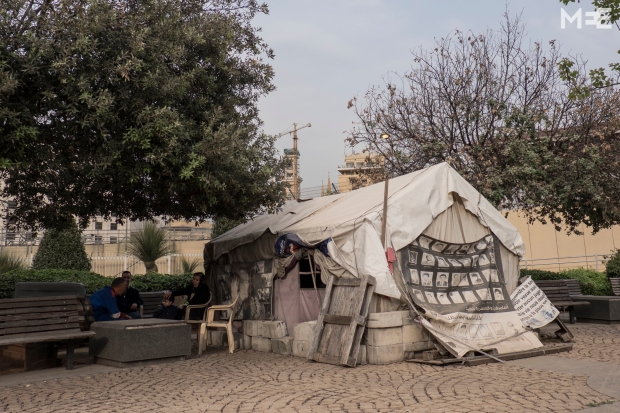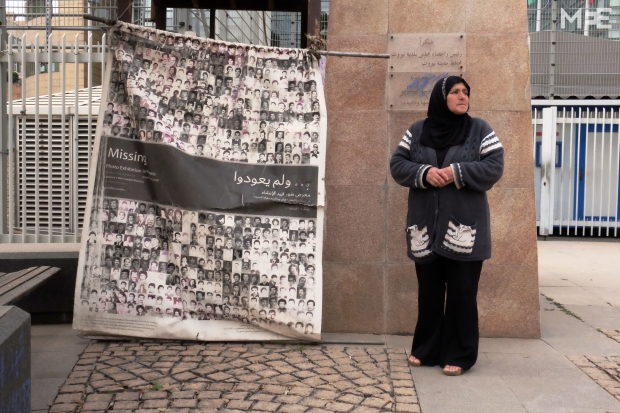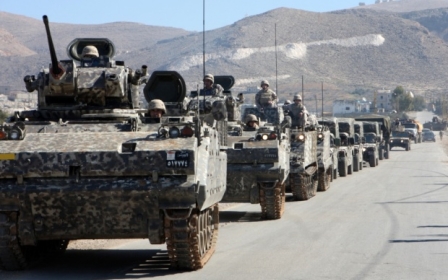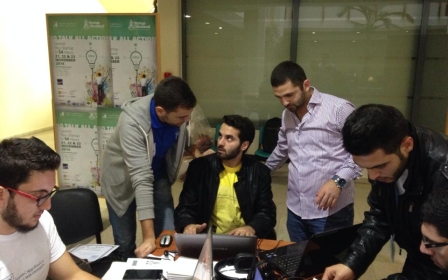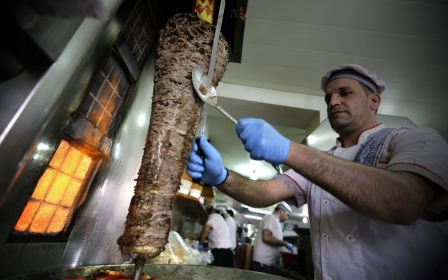The voice of the missing still resonates in Lebanon decades on
BEIRUT - Nohad Aljurdi Slim says she will fix her teeth once her son Ayman returns. Time stopped for her 33 years ago, the day Ayman disappeared during the Lebanese Civil War. Now she is 74 and many of her front teeth have fallen out, but she is still waiting.
On that fateful day when Nohad’s life was flipped upside down, 21-year-old Ayman, an employee in a bank, was returning to Beirut from Azzounieh, the family hometown, by car, together with two friends. Despite warnings from an old neighbour that the Christian Lebanese Forces had established a checkpoint along the road, Ayman continued on his journey. At that time the Lebanese Forces were engaged in a bitter conflict with the Progressive Socialist Party headed by Druze leader Walid Jumblatt. Ayman was never heard from again.
On 13 April, 2015, Lebanon commemorated the 40th anniversary of the beginning of its civil war (1975-90), a bloody winner-less conflict in which over 100,000 people were killed and an estimated 17,000 people remain missing. Many others - mothers, fathers, brothers, sisters and friends - have been searching, like Nohad, for the last 25 years to uncover the fates of their loved ones; in most cases without success.
Collective amnesia
Critics allege that the Taif agreement that helped to secure an end to Lebanon’s civil conflict prevented the establishment of an environment of culpability for civil war crimes and machinated against a more transparent, effective programme to discover the fate of the missing.
“Normally after a conflict, authorities create a national commission to solve the question of the missing. This was the case in Bosnia, Kosovo, Iraq and even Libya. Sometimes it is an independent commission, sometimes there is a ministry in charge,” explains Fabien Bourdier, delegate of The Missing Project of the International Committee of the Red Cross (ICRC) in Lebanon.
Instead of any of those measures, in Lebanon authorities imposed collective amnesia. The Taif agreement consolidated the sectarian system that has ruled the country since its independence in 1943 and enabled warlords to turn into politicians.
“Taif was a political agreement between factions and militias,” says Carmen Hassoun Abou Jaoudé, head of the International Centre for Transitional Justice (ICTJ) in Lebanon.
“Warlords became the government and parliamentary members, and they didn't want to deal with the legacy of the past,” continues Abou Jaoude, noting that the Lebanese parliament in 1991 even approved a general amnesty for most war crimes.
“Lebanese authorities said that it was necessary to forget what happened in order to build a society without tensions between communities,” asserts Justine Di Mayo, founder of the NGO Act for the Disappeared. Di Mayo says that the majority of Lebanon’s war-weary population simply agreed.
“[But] we cannot say that war stopped in 1990,” says Di Mayo. “Since then, we have been suffering cycles of violence every two or three years.”
The struggle of the families
Many families of those who disappeared refuse to be silent.
At the end of 1982, Wadad Halwani made an appeal on a local radio station. A month earlier her husband had been arrested in Beirut, and subsequently disappeared. Her search had proved fruitless and she was keen to meet other women in the same situation to combine efforts. Halwani was surprised when more than a hundred people showed up. A few weeks later, they established the Committee of the Families of the Kidnapped and Disappeared. Since then, they have been campaigning constantly for the right to know the fates of those who disappeared, though Halwani says that the authorities often prove a thorn in the side of their quest for knowledge and justice.
“Peace turned its back to us,” says Halwani. “The authorities marginalised us more than before.”
Due to the pressure from groups such as the committee, in 2000 an official commission was appointed to investigate the fate of the missing. However the commission's conclusions were not satisfactory for the families.
“They did a two-page final report, which concluded that all the disappeared were dead,” says Nizar Saghieh, a human rights lawyer who provides legal support for the families.
“In 2009 we asked the government to provide us with a copy of all the investigation documents and it refused.”
However, some respite was provided in March 2014, when Lebanon’s State Council - the country's highest court in administrative affairs - overruled the government’s position and demanded that they make available a copy of investigation documents to the affected families, in accordance with international law.
“It was the first time that a high judiciary recognised the right to know,” says Abou Jaoudé. “It’s something we can build on.”
A month later, two MPs submitted to the Lebanese parliament a draft law on the missing and disappeared on behalf of the affected families and with the support of ICTJ.
“The draft law is about the right to know, not about criminal prosecution,” explains Saghieh, noting that it proposes the creation of an independent commission with full competency to deeply investigate the fate of the missing persons.
According to the draft law’s proviso, the participants of kidnapping or sequestration will not be punished but only “those people who hide information when they are heard by the commission, violating the right to know,” explains Saghieh. Forced disappearance is qualified as a crime against humanity and, thus, is not subject to the statutes of limitations. But families have essentially renounced a right to prosecute those responsible in favour of enforcing their right to find out the fate of their loved ones.
While the draft law is yet to be approved by parliament its promoters are not completely pessimistic. “We are hoping to push the deputies and the political parties to really go ahead,” says Abou Jaoudé.
Ambiguous lost
Nohad Aljurdi Slim has traditionally been a very active member of the committee. However, currently she feels increasingly weary and disillusioned, rarely participating in the group’s activities.
She quickly turns from hope to desperation, and vice versa, when discussing the fate of her son. She knows that after 33 years, chances that he is alive are very slim. However, without evidence, she will never admit he is dead.
“Maybe he is in Israel. Maybe I will be able to see him,” says Slim, referring to an old rumour that the Lebanese Forces moved some of its prisoners to Israel during the 80s.
“Relatives of the missing have a very specific pain,” explains Bourdier of the ICRC. “The psychological term is 'ambiguous lost'.”
“As you don't know what happened to your loved ones, even if logically the person is certainly dead and everybody around tells you that, you don't want to admit it because if you do, you feel that in some way you are killing the person yourself. It's a very heavy pain and families tend to isolate themselves because it is difficult for others to understand them.”
Even decades after the disappearance of a loved one, some families still set a place at the dinner table for them every night. An old mother writes notes for her son whenever she leaves the house, just in case he returns when the house is empty. Many bedrooms have remained untouched, frozen in time, for decades. For five years after Ayman’s disappearance, Nohad used to prepare his favourite dishes almost daily, convinced his return was imminent.
Substituting the state
Like Nohad, many relatives of missing persons are becoming old, others have passed away. For such reasons in 2012, the ICRC launched an anti-disappearance data collection programme. Part and parcel of this process sees ICRC experts conduct extensive interviews with the relatives of the disappeared in order to ascertain as much information about an individual before their disappearance as possible. The group is also awaiting a green light from the Lebanese government to start a DNA sample collection, in cooperation with Lebanese forensic police.
“Because no national commission exists, we are doing its job. Once the commission is created, all this information will be handed over to them,” says Fabien Bourdier, from ICRC.
Time is, however, against those families still waiting.
“For the last 20 years, a lot of human remains have been found by accident inside construction sites or archaeological sites. It's urgent to identify mass graves locations and to protect them,” says Di Mayo, whose NGO is working on a mass graves research project. She notes that during investigations, it is easy to touch upon political-sectarian sensibilities.
“It looks like if we find a mass grave in a certain location, we need to find another mass grave, with the same amount of human remains, in another location to not be accused of pointing the responsibility to certain militia.”
Nohad has always tried to distance herself from a sectarian approach. She recalls that after the disappearance of Ayman, some neighbours suggested kidnapping a young Christian as retribution. She refused, aware that to point the finger against all of the Christian community would merely perpetuate the situation.
New MEE newsletter: Jerusalem Dispatch
Sign up to get the latest insights and analysis on Israel-Palestine, alongside Turkey Unpacked and other MEE newsletters
Middle East Eye delivers independent and unrivalled coverage and analysis of the Middle East, North Africa and beyond. To learn more about republishing this content and the associated fees, please fill out this form. More about MEE can be found here.


